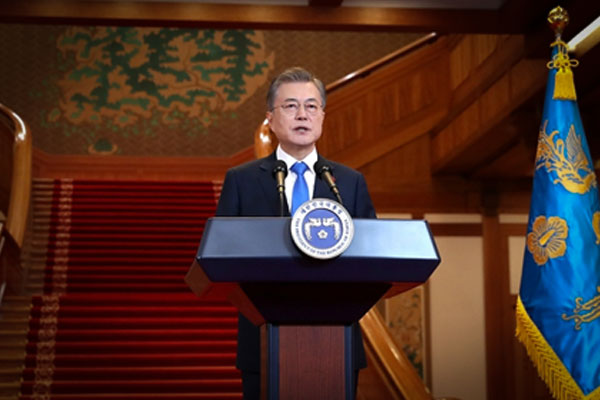The U.S. defending South Korea more actively than President Moon
Earlier this week, South Korean President Moon Jae-in condemned the recent attacks by Yemen’s Houthi rebels while keeping silent on North Korea’s repeated missile tests. Moon has shown that he’s willing to speak up about issues far from the peninsula while ignoring grave threats to South Korean security.
President Moon, who is on a trip to the Middle East, also criticized Yemen Houthi’s drone attack against the United Arab Emirates (UAE), calling it an “act that threatens peace and stability in the region.” His condemnation came as North Korea indicated on Thursday that it may return to testing of nuclear weapons or long-range missiles.
Six countries including the United States and the United Kingdom released a statement condemning North Korea’s missile launches this month. However, South Korea did not join in the statement. Additionally, during the conversation on the launches between the South Korean Foreign Minister and U.S. Secretary of State, only the U.S. side used the word “condemn.” Since the 2018 inter-Korean peace show, the Moon administration has never condemned North Korea for threatening South Korean lives.
Amid this situation, the latest news appears to show that it is the United States who is more concerned about North Korean threats and the South Korean people than is the Moon administration.
Jim Risch (R-Idaho), the ranking member of the Senate Foreign Relations Committee, released a statement on January 19 calling North Korea’s missile tests an “incredibly dangerous situation.”
“Having already fielded intercontinental ballistic missiles to threaten the United States, North Korea is now refining tactical capabilities to fight and win a war through the use of nuclear weapons,” Senator Risch said. “These tests represent key milestones in North Korea’s developing ability to coerce U.S. allies, prevent the United States from being able to respond to aggression, and to control escalation during a crisis. This is an incredibly dangerous situation.”
He also warned against prioritizing “talks” with North Korea at this point.
“Our priority needs to be on U.S. and allied cooperation and military readiness through a strong tempo of training and exercises – not on ‘talks,’ which historically have not worked.”
Senator Risch added the following:
“We must also maintain a strong nuclear deterrent, along with missile defense to protect the United States. It’s imperative we accelerate the modernization of our aging nuclear forces, maintain our own capabilities to provide extended deterrence and control escalation, and resist any moves to make dramatic or risky changes in our nuclear declaratory policy – such as a ‘sole or fundamental purpose’ policy – that would only weaken our alliances.”
Congressman Gregory Meeks (D-New York), who is Chairman of the House Foreign Affairs Committee, also released a statement on the same day saying this is not the right time to discuss declaring an end to the Korean War.
“I commend the Biden and Moon Administrations for taking steps to engage North Korea and urge North Korea to return to the negotiating table,” he began his statement. “Although I’m supportive of an end of war declaration as part of a comprehensive process and talks, a declaration on its own is meaningless if North Korea is unwilling to engage in talks, is making no progress towards denuclearization, and is actively threatening and endangering U.S. allies and regional stability.”
Meeks also condemned the latest ballistic missile launches by North Korea.
“I categorically condemn North Korea’s tests of two short-range ballistic missiles on Monday,” he said. “This is the fourth in a series of ballistic missile launches that not only violate international law, but also destabilize the entire region. North Korea must abandon its nuclear ambitions and immediately cease its provocative behavior, which only delays and complicates our ability to chart a path to peace on the Korean peninsula.”
The Chosun Ilbo newspaper ran an editorial on Thursday condemning the Moon administration on his latest comments on Yemen Houthi’s actions and silence on North Korean provocations.
“Right now, the biggest threat to our peace and national security is North Korea’s congestion of nuclear weapons and missiles,” the editorial read. “If he [Moon] is the South Korean President, he should have condemned North Korean provocations faster than anyone else and come up with measures to prepare for them. However, President Moon ‘strongly condemned’ Yemen Houthi’s threat in the Middle East which is 8,000 kilometers [4,970 miles] away from Seoul while seems to ignore North Korea’s threat against our people as if he is just watching fireworks across the river.”



